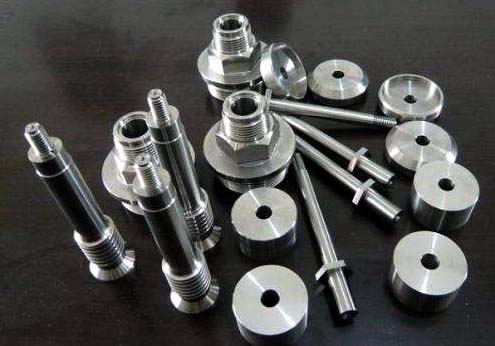Why Hard Processing Titanium Alloys
The workability of titanium alloy is 20-40% of 45# steel, hardness <HB300, there will be a strong Sticky knife phenomenon; HB>370 is too hard to make it difficult to machine, the best processed titanium alloy with hardness HB300-370.
The main reasons affecting the machinability are briefly described as follows:
1) Gas impurities (oxygen, nitrogen, hydrogen, etc.) have a great influence on the machinability of titanium alloys because titanium has a high chemical reactivity and can easily combine with gas impurities. When the temperature exceeds 600 degrees, titanium is oxidized to form an embrittlement layer, the so-called "tissue alpha layer"; Titanium and hydrogen produce hydrogen embrittlement; and nitrogen forms hard and brittle TiN at high temperatures.
2) The titanium alloy has a small plasticity, which significantly affects the plastic deformation during cutting. The deformation coefficient of titanium alloy is only 1 or even less than 1, while the deformation coefficient of ordinary carbon steel is about 3. When cutting, the swarf has a very small contact surface with the rake surface, so that the contact area pressure and the local temperature are high, and the tool wears fast.
3) Severe work hardening occurs when the titanium alloy is processed.
4) When C>0.2%, the titanium alloy will form hard carbides, which will cause abrasive wear of the tool and reduce the machinability.

The main reasons affecting the machinability are briefly described as follows:
1) Gas impurities (oxygen, nitrogen, hydrogen, etc.) have a great influence on the machinability of titanium alloys because titanium has a high chemical reactivity and can easily combine with gas impurities. When the temperature exceeds 600 degrees, titanium is oxidized to form an embrittlement layer, the so-called "tissue alpha layer"; Titanium and hydrogen produce hydrogen embrittlement; and nitrogen forms hard and brittle TiN at high temperatures.
2) The titanium alloy has a small plasticity, which significantly affects the plastic deformation during cutting. The deformation coefficient of titanium alloy is only 1 or even less than 1, while the deformation coefficient of ordinary carbon steel is about 3. When cutting, the swarf has a very small contact surface with the rake surface, so that the contact area pressure and the local temperature are high, and the tool wears fast.
3) Severe work hardening occurs when the titanium alloy is processed.
4) When C>0.2%, the titanium alloy will form hard carbides, which will cause abrasive wear of the tool and reduce the machinability.






